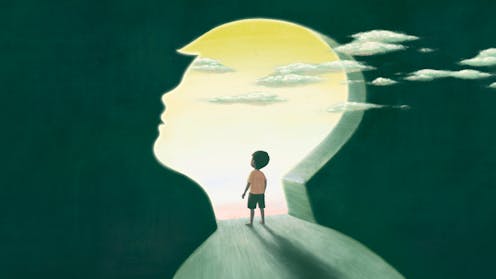
Why do we dream? Vishnu, aged nine, Kerala
That’s a really interesting question, and people have been asking it for thousands of years. But it’s difficult to answer because dreams are difficult to study scientifically.
Think about it: how easy do you find it to remember your dreams every night? Not everyone can do this. If we can’t remember our dreams, we can’t study them.
Curious Kids is a series by The Conversation that gives children the chance to have their questions about the world answered by experts. If you have a question you’d like an expert to answer, send it to curiouskids@theconversation.com and make sure you include the asker’s first name, age and town or city. We won’t be able to answer every question, but we’ll do our very best.
Some ancient cultures like the Egyptians, the Greeks and the Romans believed that dreams were important messages from the gods. But even they could not agree about exactly where dreams come from, why they happen or what they might mean.
In the last 100 years, many scientists across the world have learned a lot about the science of dreaming. But even still, there is disagreement.
Some scientists think dreams have an important job, others do not. I’ll explain some of the most well-known ideas.
Around the year 1900, an Austrian psychologist (someone who studies how we think) called Sigmund Freud published an influential book called The Interpretation of Dreams. In it, Freud wrote about his experiences of talking to other people about their dreams (and his own dreams too).
He believed that dreams came from wishes or desires buried deep in the mind. He thought these wishes were usually transformed in some way to disguise them in the dream, as they could be quite scary or rude.
Freud would help people to work out what these hidden wishes and desires might be, so they could address them in waking life. He also wrote that dreams are a part of the process that helps keep us asleep, that dreams protect sleep from disturbances. And there is some evidence to support that idea.
Freud’s ideas had a great influence on thinking about dreams for many decades. But since Freud’s time, we have learned much more about how sleep works. And that has inspired new ideas about what dreams might (or might not) be doing.
In the 1970s, scientists like Allan Hobson started to reject Freud’s ideas about dreams, and suggested that perhaps dreams don’t do anything important. In Hobson’s view, dreams had no hidden meaning or function to them.
He thought they might just be random side-effects of chemical processes going on in the brain during sleep. It is one good explanation for why dreams often seem so strange. Hobson thought little bits and pieces of knowledge and imagination get activated and merge together meaninglessly.
But other scientists since then have noticed that not all dreams are strange. Many of them are in fact quite ordinary, and some have content that is important to the dreamer.
Perhaps you have dreamed about something that happened in your life recently, like a fun day out with your school friends or family, or maybe you dreamed you were in a film you watched the day before.
We often dream about things that had a significant effect on us in waking life, or are related to worries we carry with us. And this I think is the most important thing we need to realise: our dreams are connected with our waking lives.

Some scientists now believe that dreaming about these things might help us to process them, or give us new ideas about what to do in our waking life. This is still difficult to test though. Whether or not this is what dreams are really doing by themselves, you have the choice to look at your dreams and decide what new ideas you can draw from them.
Another interesting idea is that dreams evolved long ago to help us survive threats. A lot of people seem to report dreaming about being chased by monsters or dangerous animals. Maybe you have too.
Some scientists see this as evidence for a threat simulation system that emerged back when we were living in caves and had to hunt for our food while trying not to be hunted ourselves.
If we survive a threatening encounter in a dream, that could better prepare us for surviving real threats when we are awake. The problem with this idea though is that it is too dangerous to test properly.
Even if someone dreams about fighting a tiger, for example, scientists cannot then lock people in a cage with a real tiger and see how well they survive!
That’s one of the exciting things about being a scientist. There are still lots of questions to answer and we’re learning new things all the time.
Anthony Bloxham does not work for, consult, own shares in or receive funding from any company or organisation that would benefit from this article, and has disclosed no relevant affiliations beyond their academic appointment.
This article was originally published on The Conversation. Read the original article.







